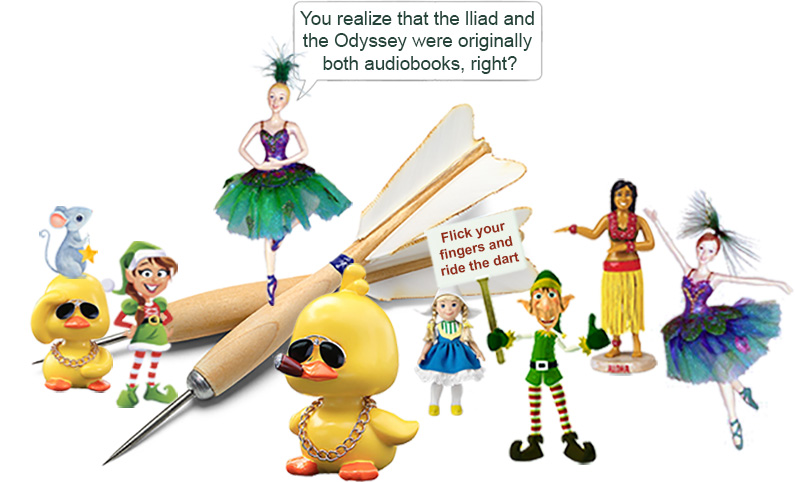It is naive to believe the world is a meritocracy, but it is defeatist to believe that you can’t win.
Six years ago, notacoward wrote,
“Entrepreneurship is like one of those carnival games where you throw darts or something.
Middle class kids can afford one throw. Most miss. A few hit the target and get a small prize. A very few hit the center bullseye and get a bigger prize. Rags to riches! The American Dream lives on.
Rich kids can afford many throws. If they want to, they can try over and over and over again until they hit something and feel good about themselves. Some keep going until they hit the center bullseye, then they give speeches or write blog posts about ‘meritocracy’ and the salutary effects of hard work.
Poor kids aren’t visiting the carnival. They’re the ones working it.”
We’ve all seen what notacoward was describing, haven’t we? Each of us knows people who were born on third base and think they hit a triple. They populate the royal families, the financial aristocracies, the college fraternities, and the luxury resorts of our planet. The business world is full of empty suits and corporate assholes who like to pretend they earned what they were given.
When you grow up in the poor part of town, you see hardworking people shake their heads and say,
“It’s not what you know; it’s who you know.”
“It’s not what you know; it’s who you know.”
“It’s not what you know; it’s who you know.”
This is nothing new. It has always been true. But it doesn’t have to apply to YOU.
I knew it didn’t apply to me because I once heard a 3,000-year-old story of a shepherd boy who became King because he was stunningly good at being a shepherd boy. When a lion attacked his sheep, he killed the lion. When a bear attacked his sheep, he killed the bear. And when a giant taunted his nation, he killed the giant.
The son of that King later wrote,
“Do you see a person skilled in his work?
He will stand before kings;
He will not stand before obscure people.” **
Is it wise to protect the ones we love from the problems that taught us all we know?
I know a lot of successful people who wish they knew how to give their children the hardships that made them rich.
One successful young friend – just 42 years old – has created four separate fortunes during the past 20 years and is working on a fifth one. He started with nothing: no family money, no angel investor, no connections. His only assets were his courage and his relentless efforts. I asked him recently what advice he would offer the emerging generation. He said,
“I think the question this younger generation needs to be asking themselves is, ‘Ok, now what?’ Yes, it sucks, but it also sucks that previous generations were drafted and shipped off to die in wars.
So shit happens. And sometimes people slip through the cracks.
I’m happy to not call them ‘lazy’ if they’re willing to acknowledge that they still bear the responsibility of doing something… anything… to improve their lot.
Because lingering in whiney little bitch mode sure ain’t gonna get it done.”
If you have fallen into the trap of believing that you don’t have the money or the connections to rise above your circumstances, lift your head and open your ears to what I am about to tell you: Become exceptional. Figure out how to kill the lion. And then kill the bear. Solve the problem. And you will soon become the person that everyone – even the King – wants at their side.
Do what you can, with what you’ve got, where you are.***
Roy H. Williams
PS – “‘Ole!’ to you, just for having the sheer human love and stubbornness to keep showing up.”
– Elizabeth Gilbert
*** “Do what you can, with what you’ve got, where you are,” is generally attributed to Teddy Roosevelt, but he credits it to Squire Bill Widener of Widener’s Valley, Virginia in the 9th chapter of his Autobiography. I suspect that Bill Widener was noticed by Roosevelt because he was “skilled in his work.” As a consequence, Widener stood before Kings. He did not stand before obscure people.
 Jennifer Brown sizes up business on how well they address today’s ever-increasing demand for inclusive workplaces. Are you (1.) unaware, (2.) aware, (3.) active, or (4.) advocate? Do you want to create a productive work environment for every employee? Google, Johnson & Johnson, IBM, Disney, and Coca-Cola have all asked for her help, but you don’t need to be a big company CEO to benefit from her insights. All you need to do is join Jennifer and roving reporter Rotbart for a brief soirée right now at MondayMorningRadio.com.
Jennifer Brown sizes up business on how well they address today’s ever-increasing demand for inclusive workplaces. Are you (1.) unaware, (2.) aware, (3.) active, or (4.) advocate? Do you want to create a productive work environment for every employee? Google, Johnson & Johnson, IBM, Disney, and Coca-Cola have all asked for her help, but you don’t need to be a big company CEO to benefit from her insights. All you need to do is join Jennifer and roving reporter Rotbart for a brief soirée right now at MondayMorningRadio.com.
